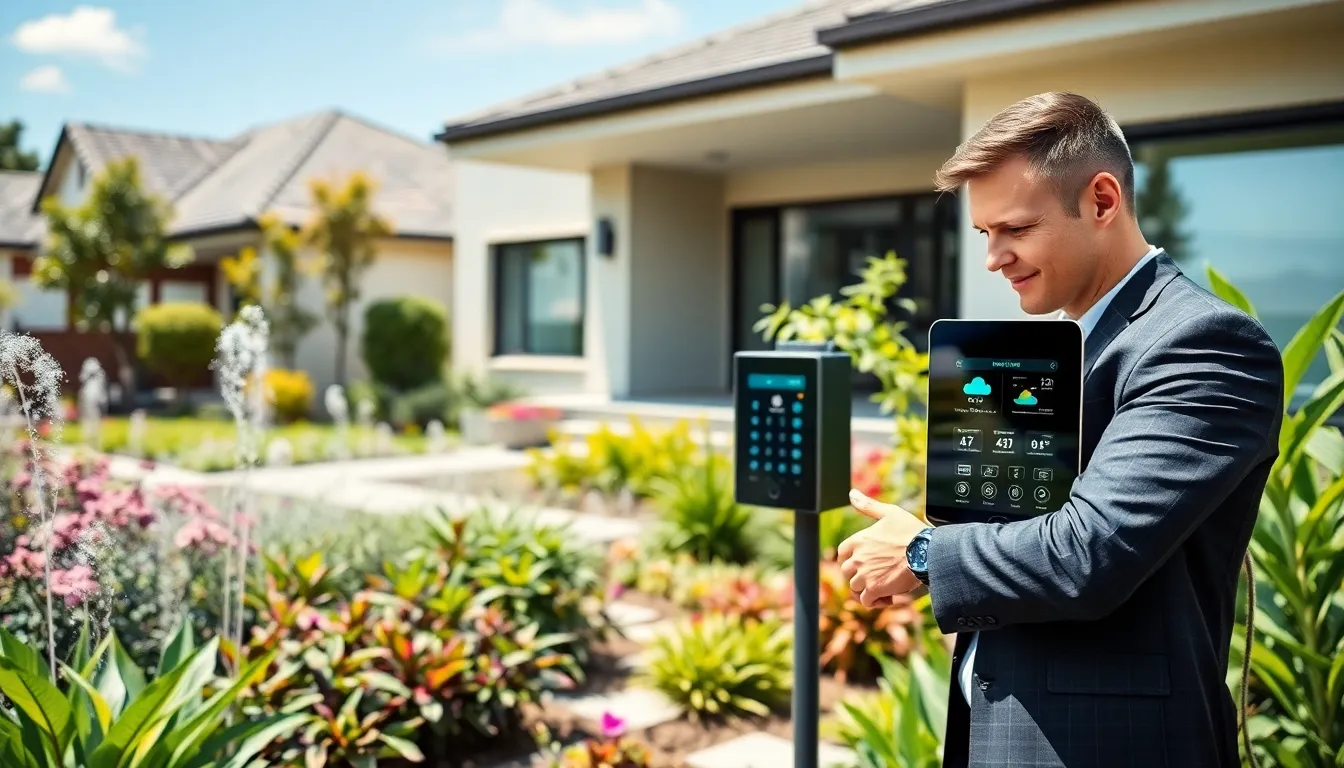Table of Contents
ToggleIn a world where fast food reigns supreme and couch surfing is an Olympic sport, embracing a healthy lifestyle can feel like climbing Everest in flip-flops. Enter healthy lifestyle apps, the trusty sidekicks that make wellness feel less like a chore and more like a fun adventure. These digital companions are packed with features that transform meal prep into a culinary quest and workouts into exhilarating challenges.
Imagine tracking your steps while simultaneously competing with friends over who can do the most squats—because who said fitness can’t have a competitive edge? With a plethora of options tailored to different needs, these apps don’t just help users get fit; they turn the journey into a game. So, if you’re ready to swap out those chips for kale and get off the couch, it’s time to explore how these apps can revolutionize your approach to health.
Overview of Healthy Lifestyle Apps
Healthy lifestyle apps serve as practical solutions for individuals aiming to improve their well-being. These applications offer features such as personalized meal plans, fitness tracking, and community support, making it easier to adopt and maintain healthier habits. Users often find that these tools encourage accountability through goal setting and social interaction.
Many apps include gamification elements that enhance user engagement. By turning mundane tasks like exercising and meal preparation into challenges, these platforms motivate users to stay active. Competitions among friends often drive sustained participation, promoting a sense of camaraderie.
Popular apps in this category include MyFitnessPal, which aids in calorie counting and nutrition tracking, and Strava, focused on running and cycling. Users benefit from real-time data and progress reports, which help in tracking achievements and setting future goals. Further, Noom emphasizes behavior change with a psychology-based approach, guiding users toward healthier lifestyle choices.
Community features within these apps often create networks of support. Users share experiences, tips, and encouragement, fostering an inclusive environment. Regular updates and new features ensure that these applications evolve with the latest health trends, providing users with cutting-edge tools.
The growing field of healthy lifestyle apps reflects the increasing demand for accessible wellness resources. Individuals can explore various applications tailored to specific fitness goals, dietary preferences, or mental wellness. Ultimately, healthy lifestyle apps significantly enhance the wellness journey by promoting engagement and accountability.
Features to Look For

Healthy lifestyle apps come with various features that enhance user experience and support health goals.
User Interface and Experience
An intuitive user interface promotes engagement and ease of navigation. Clean layouts simplify finding necessary features, encouraging regular use. Responsive design enables accessibility across devices, whether on smartphones or tablets. This adaptability helps users maintain their routines seamlessly. Friendly visuals and interactive elements boost motivation, making the app enjoyable to use. Users often prefer apps that integrate gamification, as it transforms workouts and meal prep into engaging challenges.
Personalization and Customization
Personalization features cater to individual preferences and goals. Custom meal plans, created based on dietary needs, help users stick to their health journeys. Individualized workout suggestions adapt to fitness levels, ensuring the right challenges for every user. Some apps allow users to set personal milestones, enhancing commitment and accountability. Custom notifications serve as gentle reminders, helping users stay consistent in their habits. This tailored approach significantly improves user satisfaction and retention.
Data Tracking and Metrics
Comprehensive data tracking offers insights into users’ habits and progress. Users can monitor daily calorie intake, exercise routines, and weight changes effectively. Graphs and visual representations help users understand trends over time, fostering awareness and motivation. Reliable apps utilize real-time metrics to provide updates on performance, which is crucial for goal-setting. Sharing data with friends creates a competitive atmosphere, driving users to achieve their desired results. In-depth analysis aids users in making informed decisions about their health and fitness activities.
Popular Healthy Lifestyle Apps
Healthy lifestyle apps serve as essential tools for anyone aiming to enhance their well-being. They combine technology and user engagement, making it easier to form healthy habits.
Fitness Tracking Apps
Fitness tracking apps like Strava and Fitbit allow users to monitor their physical activity. Users can log workouts, track cardio sessions, and set specific fitness goals. Features such as real-time data and social sharing support motivation. The competitive aspect encourages users to achieve personal bests while fostering community interaction. Data analytics provide visual insights into progress, helping users stay accountable. Extensive integration with wearable devices enhances the tracking experience and improves accuracy.
Nutrition and Meal Planning Apps
Nutrition and meal planning apps, such as MyFitnessPal and Yummly, streamline the process of healthy eating. Users can access vast databases of food items for accurate calorie tracking. These apps often provide personalized meal plans tailored to dietary preferences. User-generated recipes enhance variety, while grocery list features simplify shopping. Additionally, progress tracking facilitates awareness of caloric intake and nutrient balance. Meal prep becomes effortless and enjoyable, encouraging adherence to nutrition goals.
Mindfulness and Meditation Apps
Mindfulness and meditation apps, including Headspace and Calm, promote mental well-being through guided sessions. Users can explore various meditation techniques for stress relief and focus enhancement. These apps offer personalized recommendations based on individual needs. Options include short sessions for busy schedules and in-depth courses for deeper practice. Regular use fosters relaxation and promotes lasting mindfulness practices. Access to community forums also provides support and shared experiences, enriching the meditation journey.
Benefits of Using Healthy Lifestyle Apps
Healthy lifestyle apps offer numerous advantages that simplify the path to well-being. Users benefit from personalized meal plans tailored to their dietary needs and preferences. Tracking fitness progress becomes straightforward through user-friendly interfaces, which motivate users to achieve their goals.
One key benefit is the community support these apps foster. Engaging with friends in friendly competitions makes adopting healthier habits enjoyable. Users often find encouragement in sharing milestones and setbacks, creating a supportive environment that aids commitment.
Additionally, gamification elements play a crucial role in enhancing engagement. Turning meal prep and workouts into games allows users to tackle mundane tasks with enthusiasm. Many users report improved adherence to their fitness routines when tasks feel less like chores and more like challenges.
Real-time data tracking provides insights into habits and behaviors. Users can monitor their calorie intake, workouts, and mental well-being in one place. This comprehensive approach enables users to make informed decisions about their health.
Another advantage is the availability of reminders and notifications. Regular prompts help users stay on track with their goals, ensuring they don’t lose sight of their health objectives. Many apps allow for customization in settings, meaning reminders can be adjusted to fit individual schedules.
Overall, these benefits highlight how healthy lifestyle apps play an essential role in modern wellness journeys. Engaging features, community connections, and personalized support ensure these apps contribute positively to users’ lives. Transitioning to a healthier lifestyle becomes more manageable and enjoyable with the right resources at hand.
Potential Drawbacks
Healthy lifestyle apps come with several potential drawbacks that users should consider. Distractions from notifications can disrupt focus and detract from real-life experiences. Too much reliance on these apps might lead to users overlooking other vital aspects of health, such as sleep quality and emotional well-being.
Data privacy concerns also exist, as many apps collect personal information that may not be adequately safeguarded. Users must be cautious about sharing sensitive data and read privacy policies carefully. Inconsistent data tracking may occur, leading to frustration when users don’t see accurate reflections of their progress.
Overwhelming amounts of information in some apps can make navigation difficult, especially for those unfamiliar with digital interfaces. Individuals may also feel pressured by social sharing features, as competition among friends could lead to anxiety rather than motivation.
Another issue stems from the varying effectiveness of gamification. Some users may prefer traditional methods of motivation and find the game-like aspects unhelpful. Additionally, subscription costs for premium features can become a financial burden, discouraging long-term use.
Users should evaluate whether these drawbacks align with their personal health journey. Despite the potential benefits, understanding the limitations of healthy lifestyle apps ensures that individuals can make informed choices that support their overall wellness effectively.
Healthy lifestyle apps are revolutionizing how individuals approach wellness in today’s fast-paced world. By providing personalized meal plans fitness tracking and community support they make adopting healthier habits more accessible and enjoyable. The gamification elements incorporated into these apps not only motivate users but also foster a sense of camaraderie among friends and family.
While these apps offer numerous benefits they also come with potential drawbacks that users should carefully consider. Balancing app usage with real-life experiences is crucial for maintaining overall health. Ultimately healthy lifestyle apps can serve as valuable tools on the journey to wellness when used thoughtfully and in conjunction with other healthy practices.





